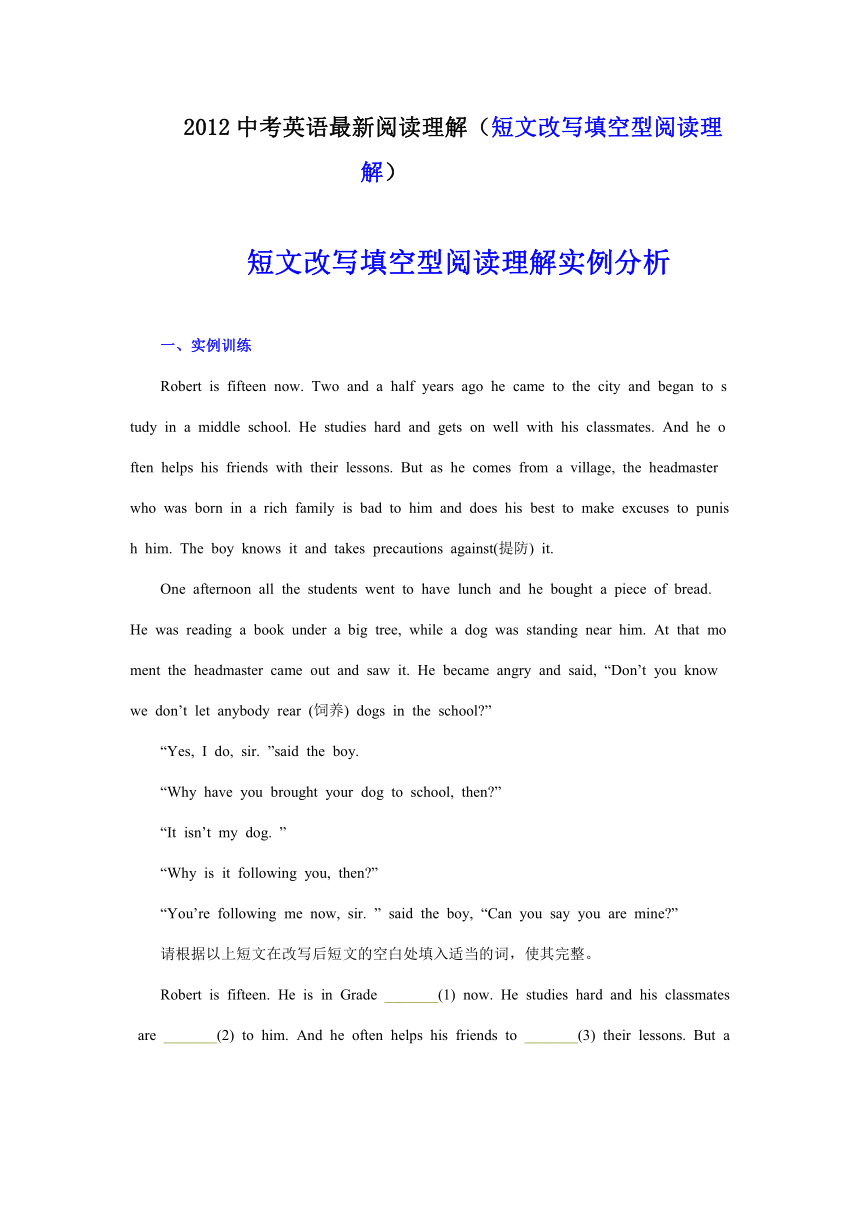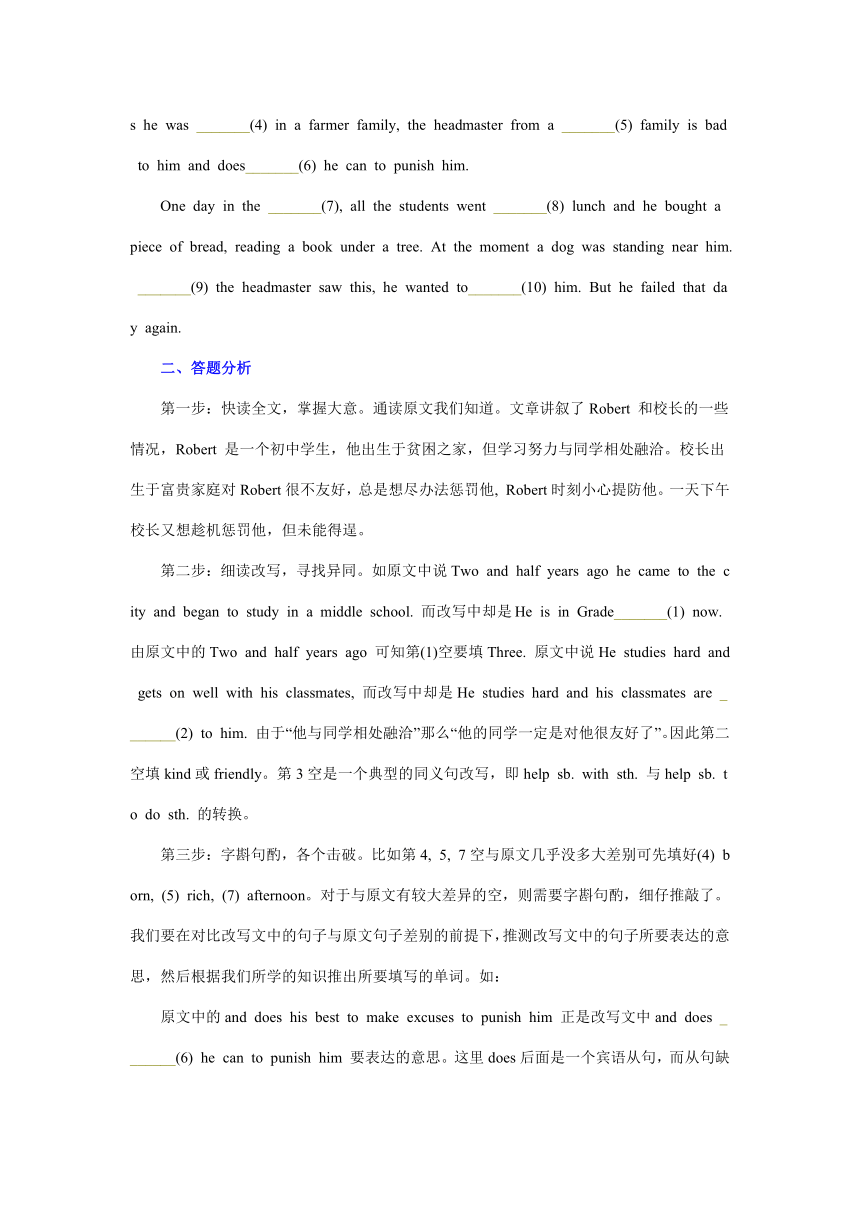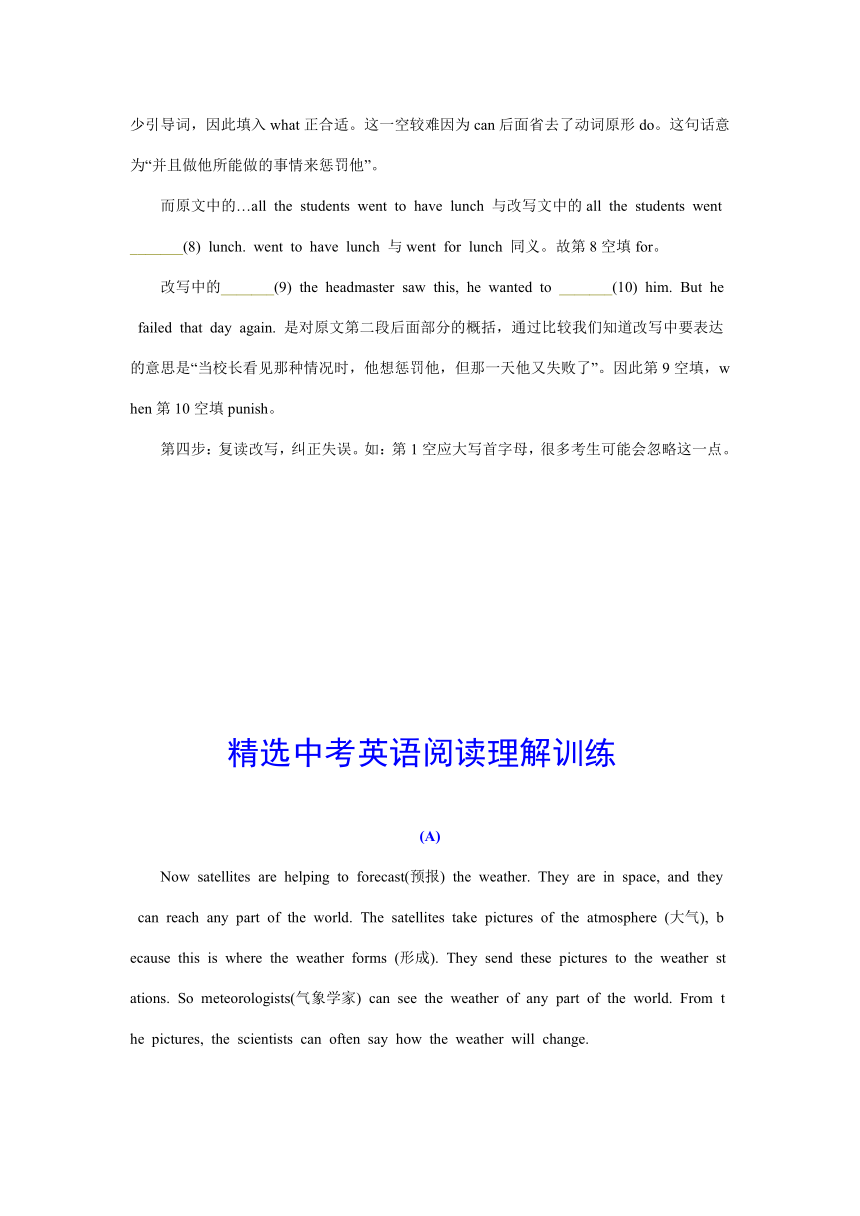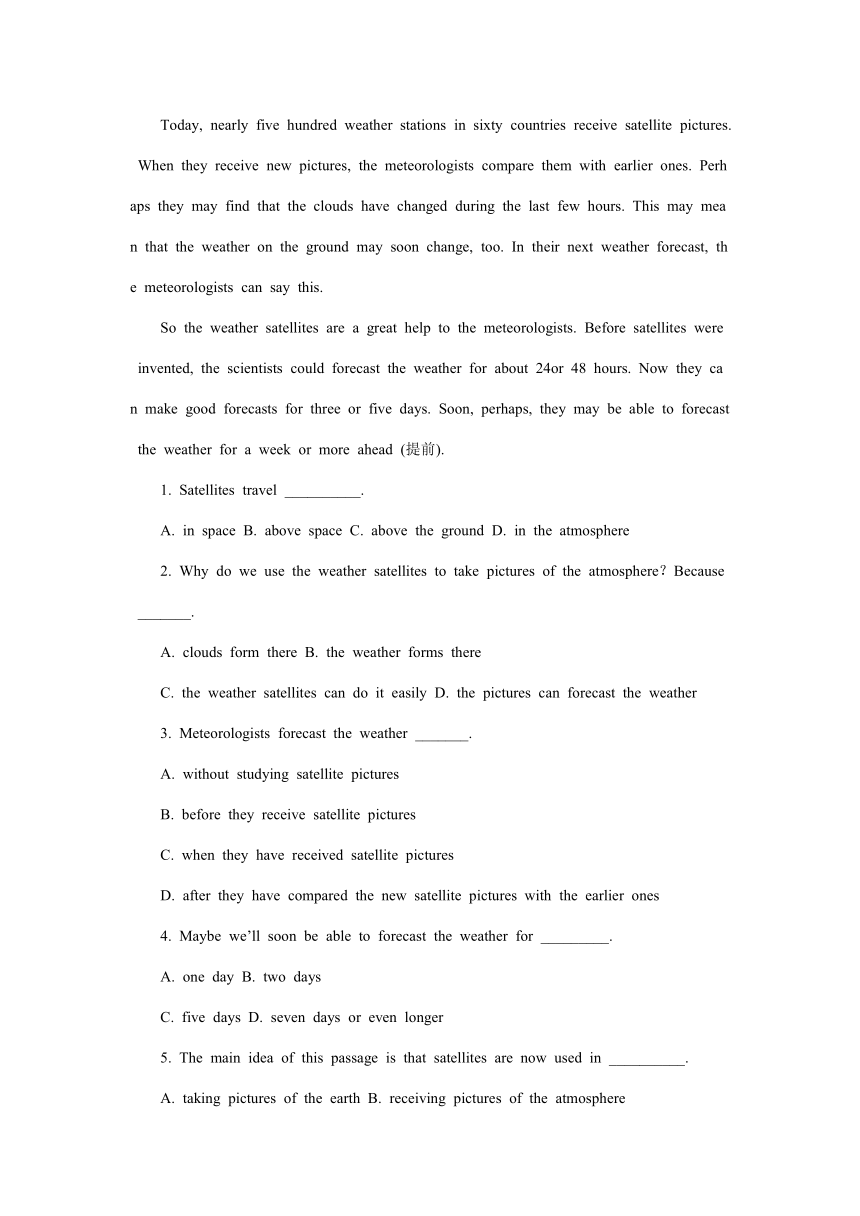2012中考英语最新阅读理解(短文改写填空型阅读理解)
文档属性
| 名称 | 2012中考英语最新阅读理解(短文改写填空型阅读理解) |

|
|
| 格式 | zip | ||
| 文件大小 | 18.7KB | ||
| 资源类型 | 教案 | ||
| 版本资源 | 通用版 | ||
| 科目 | 英语 | ||
| 更新时间 | 2012-02-18 00:00:00 | ||
图片预览




文档简介
2012中考英语最新阅读理解(短文改写填空型阅读理解)
短文改写填空型阅读理解实例分析
一、实例训练
Robert is fifteen now. Two and a half years ago he came to the city and began to study in a middle school. He studies hard and gets on well with his classmates. And he often helps his friends with their lessons. But as he comes from a village, the headmaster who was born in a rich family is bad to him and does his best to make excuses to punish him. The boy knows it and takes precautions against(提防) it.
One afternoon all the students went to have lunch and he bought a piece of bread. He was reading a book under a big tree, while a dog was standing near him. At that moment the headmaster came out and saw it. He became angry and said, “Don’t you know we don’t let anybody rear (饲养) dogs in the school ”
“Yes, I do, sir. ”said the boy.
“Why have you brought your dog to school, then ”
“It isn’t my dog. ”
“Why is it following you, then ”
“You’re following me now, sir. ” said the boy, “Can you say you are mine ”
请根据以上短文在改写后短文的空白处填入适当的词,使其完整。
Robert is fifteen. He is in Grade _______(1) now. He studies hard and his classmates are _______(2) to him. And he often helps his friends to _______(3) their lessons. But as he was _______(4) in a farmer family, the headmaster from a _______(5) family is bad to him and does_______(6) he can to punish him.
One day in the _______(7), all the students went _______(8) lunch and he bought a piece of bread, reading a book under a tree. At the moment a dog was standing near him. _______(9) the headmaster saw this, he wanted to_______(10) him. But he failed that day again.
二、答题分析
第一步:快读全文,掌握大意。通读原文我们知道。文章讲叙了Robert 和校长的一些情况,Robert 是一个初中学生,他出生于贫困之家,但学习努力与同学相处融洽。校长出生于富贵家庭对Robert很不友好,总是想尽办法惩罚他, Robert时刻小心提防他。一天下午校长又想趁机惩罚他,但未能得逞。
第二步:细读改写,寻找异同。如原文中说Two and half years ago he came to the city and began to study in a middle school. 而改写中却是He is in Grade_______(1) now. 由原文中的Two and half years ago 可知第(1)空要填Three. 原文中说He studies hard and gets on well with his classmates, 而改写中却是He studies hard and his classmates are _______(2) to him. 由于“他与同学相处融洽”那么“他的同学一定是对他很友好了”。因此第二空填kind或friendly。第3空是一个典型的同义句改写,即help sb. with sth. 与help sb. to do sth. 的转换。
第三步:字斟句酌,各个击破。比如第4, 5, 7空与原文几乎没多大差别可先填好(4) born, (5) rich, (7) afternoon。对于与原文有较大差异的空,则需要字斟句酌,细仔推敲了。我们要在对比改写文中的句子与原文句子差别的前提下,推测改写文中的句子所要表达的意思,然后根据我们所学的知识推出所要填写的单词。如:
原文中的and does his best to make excuses to punish him 正是改写文中and does _______(6) he can to punish him 要表达的意思。这里does后面是一个宾语从句,而从句缺少引导词,因此填入what正合适。这一空较难因为can后面省去了动词原形do。这句话意为“并且做他所能做的事情来惩罚他”。
而原文中的…all the students went to have lunch 与改写文中的all the students went _______(8) lunch. went to have lunch 与went for lunch 同义。故第8空填for。
改写中的_______(9) the headmaster saw this, he wanted to _______(10) him. But he failed that day again. 是对原文第二段后面部分的概括,通过比较我们知道改写中要表达的意思是“当校长看见那种情况时,他想惩罚他,但那一天他又失败了”。因此第9空填,when第10空填punish。
第四步:复读改写,纠正失误。如:第1空应大写首字母,很多考生可能会忽略这一点。
精选中考英语阅读理解训练
(A)
Now satellites are helping to forecast(预报) the weather. They are in space, and they can reach any part of the world. The satellites take pictures of the atmosphere (大气), because this is where the weather forms (形成). They send these pictures to the weather stations. So meteorologists(气象学家) can see the weather of any part of the world. From the pictures, the scientists can often say how the weather will change.
Today, nearly five hundred weather stations in sixty countries receive satellite pictures. When they receive new pictures, the meteorologists compare them with earlier ones. Perhaps they may find that the clouds have changed during the last few hours. This may mean that the weather on the ground may soon change, too. In their next weather forecast, the meteorologists can say this.
So the weather satellites are a great help to the meteorologists. Before satellites were invented, the scientists could forecast the weather for about 24or 48 hours. Now they can make good forecasts for three or five days. Soon, perhaps, they may be able to forecast the weather for a week or more ahead (提前).
1. Satellites travel __________.
A. in space B. above space C. above the ground D. in the atmosphere
2. Why do we use the weather satellites to take pictures of the atmosphere?Because _______.
A. clouds form there B. the weather forms there
C. the weather satellites can do it easily D. the pictures can forecast the weather
3. Meteorologists forecast the weather _______.
A. without studying satellite pictures
B. before they receive satellite pictures
C. when they have received satellite pictures
D. after they have compared the new satellite pictures with the earlier ones
4. Maybe we’ll soon be able to forecast the weather for _________.
A. one day B. two days
C. five days D. seven days or even longer
5. The main idea of this passage is that satellites are now used in __________.
A. taking pictures of the earth B. receiving pictures of the atmosphere
C. weather forecasting D. doing other work in many ways
(B)
There was once a man called Mr. Flowers, and flowers were his only joy in life. He spent all his free time in one of his four glass-houses and grew flowers of every color, with long and difficult names, for competitions (比赛). He tried to grow a rose of a new color to win the silver cup (银杯) for the Rose of the Year.
Mr. Flowers’ glass-houses were very near to a middle school. Boys of around thirteen of age were often tempted (引诱) to throw a stone or two at one of Mr. Flowers’ glass-houses. So Mr. Flowers did his best to be in or near his glass-houses at the beginning and end of the school day.
But it was not always possible to be on watch at those times. Mr. Flowers had tried in many ways to protect his glass, but nothing that he had done had been useful. He had been to school to report to the headmaster; but this had not done any good. He had tried to drive away the boys that threw stones into his garden; but the boys could run faster than he could, and they laughed at him from far away. He had even picked up all the stones that he could find around his garden, so that the boys would have nothing to throw; but they soon found others.
At last Mr. Flowers had a good idea. He put up a large notice (布告) made of good, strong wood, some meters away from the glass-houses. On it he had written the words: DO NOT THROW STONES AT THIS NOTICE. After this, Mr. Flowers had no further trouble; the boys were much more tempted to throw stones at the notice than at the glass-houses.
6. It was Mr. Flowers’ hope to ________.
A. build glass-houses in his free time
B. grow the Rose of the Year in a silver cup
C. win a silver cup for growing a rose of a new color
D. grow a rose with the longest name
7. Boys were often tempted to ________.
A. throw stones at Mr. Flowers’ glass-house
B. throw stones at Mr. Flowers from their school
C. be in or near by Mr. Flowers’ glass-houses
D. play with Mr. Flowers near his glass-houses
8. Mr. Flowers stayed in or near by his glass-houses _______.
A. at times when school-boys were walking near them
B. all the school day when there were no boys about
C. where he could not be seen by the boys passing
D. in his free time at the beginning and end of the school day
9. Mr. Flowers had tried to ______ to protect his glass.
A. be on watch in his free time B. ask the headmaster for help
C. pick up all the stones around his garden D. do all the above
10. Mr. Flowers’ good idea was to ______.
A. write some words on the glass
B. put up a large notice to cover his glass-houses
C. give the boys something else to throw stones at
D. send for policemen
(C)
Come to Austria!
Soll is a village in the mountains in western Austria, and the Hotel Post, opened by a local (当地的) family, is clean and not expensive. From the hotel you can see the whole village, the forest and the mountains. Temperatures in summer are usually 20℃ to 25℃ in the daytime, but much cooler by evening.
Enjoy Thailand!
When you visit Bangkok in Thailand, don’t miss the early morning river boat trip to the Floating (漂浮的) Market just outside the city. There you will find many kinds of fruits and vegetables. There you can pay for them when you sit in your boat. Don’t forget your hat: the sun can be strong and it may be as hot as 40℃ about midday!
Visit Hawaii!
Maybe the most beautiful place in Hawaii is Kauai. You can visit its long, sandy beaches in the south and west of the island, and mountains and forests in the north, but be careful: there are many mosquitoes (蚊子), and don’t be surprised if it rains in the center of the island. Daytime temperatures there are usually around 24℃ to 26℃ by the sea, and only a little cooler by late evening.
根据上面的三则广告,在下面句子的空白处填入适当的词。
11. If you stay at the Hotel Post, you have a view (风景) of______.
12. At the Floating Market you can buy things in ______.
13. Because the sun is strong in Bangkok, you should bring______.
14. In the north of Kauai Island there are______.
15. The warmest place of the three is______.
【答案及解析】
(A) 这篇阅读材料向我们介绍了气象卫星在预报天气中所发挥的重要作用。如今,许多国家的气象站都是在接收到卫星云图后,由气象学家进行研究分析,然后预报天气的。在卫星的帮助下,人们可以预测未来三五天或更长时间内的天气状况。
1. A。本题属表层理解题。短文首句即是答案之所在。
2. D。From the pictures,the scientists can often say how the weather will change 是该小题答案的出处。
3. D。答案就在 the meteorologists compare them with earlier ones. Perhaps they may find that the clouds have changed during the last few hours. This may mean that the weather on the ground may soon change, too 中。
4. D。文章结尾的 Soon, perhaps, they may be able to forecast the weather for a week or more ahead 这句即是答案之所在。
5. C。短文首句即点明了主旨。
(B) Mr. Flowers嗜花如命,他种花的暖房位于一所学校附近。一些男孩子经常朝他种花的暖房上扔石块。尽管他绞尽脑汁,想尽了一切办法,都无济于事。最后Mr. Flowers想出了一个高招。他挂起了一块结实的布告牌,上面写着“请不要朝布告牌扔石块”。孩子们的兴趣于是转向了这块木牌,Mr. Flowers自此高枕无忧了。
6. C。“…to win the silver cup for the Rose of the Year.”一句中,不定式在句中作目的状语,也是Mr. Flowers的愿望之所在。
7. A。第二段前两句有明确的说明。
8. D。“So Mr. Flowers did his best to be in or near his glass-houses at the beginning and end of the school day.”是该题的出处。(from www.)
9. D。为了保护自己的玻璃房子不受损坏,想尽了各种方法。选项A、B、C所述内容均在文中有明确的阐述。
10. C。由最后一段,特别是其中的关键词large, good, strong以及布告上的DO NOT THROW STONES AT THIS NOTICE, 可知他制作布告牌的真正目的不是要它对孩子们起警示作用,而是利用孩子们的心理让其当作他们投掷的靶子。
(C) 这是三则介绍旅游风景区景点的广告。
11. the whole village, the forest and the mountains。 答案即在“From the hotel you can see the whole village, the forest and the mountains.”这句话中。
12. in your boat。根据“There you can pay for them when you sit in your boat.”一句,可知答案。
13. your hat。“Don’t forget your hat: the sun can be strong and it may be as hot as 40℃ about midday!”一句是答案的出处。
14. mountains, forests and many mosquitoes。本题属表层信息理解题。答案源自“…and mountains and forests in the north, but be careful: there are many mosquitoes…”一句中。
15. Bangkok in Thailand 。 这三则广告中所出现的气温方面的信息分别是:①Temperatures in summer are usually 20℃ to 25℃ in the daytime, but much cooler by evening. ② the sun can be strong and it may be as hot as 40℃ about midday! ③ Daytime temperatures there are usually around 24℃ to 26℃ by the sea, and only a little cooler by late evening. 不难看出正确答案。
短文改写填空型阅读理解实例分析
一、实例训练
Robert is fifteen now. Two and a half years ago he came to the city and began to study in a middle school. He studies hard and gets on well with his classmates. And he often helps his friends with their lessons. But as he comes from a village, the headmaster who was born in a rich family is bad to him and does his best to make excuses to punish him. The boy knows it and takes precautions against(提防) it.
One afternoon all the students went to have lunch and he bought a piece of bread. He was reading a book under a big tree, while a dog was standing near him. At that moment the headmaster came out and saw it. He became angry and said, “Don’t you know we don’t let anybody rear (饲养) dogs in the school ”
“Yes, I do, sir. ”said the boy.
“Why have you brought your dog to school, then ”
“It isn’t my dog. ”
“Why is it following you, then ”
“You’re following me now, sir. ” said the boy, “Can you say you are mine ”
请根据以上短文在改写后短文的空白处填入适当的词,使其完整。
Robert is fifteen. He is in Grade _______(1) now. He studies hard and his classmates are _______(2) to him. And he often helps his friends to _______(3) their lessons. But as he was _______(4) in a farmer family, the headmaster from a _______(5) family is bad to him and does_______(6) he can to punish him.
One day in the _______(7), all the students went _______(8) lunch and he bought a piece of bread, reading a book under a tree. At the moment a dog was standing near him. _______(9) the headmaster saw this, he wanted to_______(10) him. But he failed that day again.
二、答题分析
第一步:快读全文,掌握大意。通读原文我们知道。文章讲叙了Robert 和校长的一些情况,Robert 是一个初中学生,他出生于贫困之家,但学习努力与同学相处融洽。校长出生于富贵家庭对Robert很不友好,总是想尽办法惩罚他, Robert时刻小心提防他。一天下午校长又想趁机惩罚他,但未能得逞。
第二步:细读改写,寻找异同。如原文中说Two and half years ago he came to the city and began to study in a middle school. 而改写中却是He is in Grade_______(1) now. 由原文中的Two and half years ago 可知第(1)空要填Three. 原文中说He studies hard and gets on well with his classmates, 而改写中却是He studies hard and his classmates are _______(2) to him. 由于“他与同学相处融洽”那么“他的同学一定是对他很友好了”。因此第二空填kind或friendly。第3空是一个典型的同义句改写,即help sb. with sth. 与help sb. to do sth. 的转换。
第三步:字斟句酌,各个击破。比如第4, 5, 7空与原文几乎没多大差别可先填好(4) born, (5) rich, (7) afternoon。对于与原文有较大差异的空,则需要字斟句酌,细仔推敲了。我们要在对比改写文中的句子与原文句子差别的前提下,推测改写文中的句子所要表达的意思,然后根据我们所学的知识推出所要填写的单词。如:
原文中的and does his best to make excuses to punish him 正是改写文中and does _______(6) he can to punish him 要表达的意思。这里does后面是一个宾语从句,而从句缺少引导词,因此填入what正合适。这一空较难因为can后面省去了动词原形do。这句话意为“并且做他所能做的事情来惩罚他”。
而原文中的…all the students went to have lunch 与改写文中的all the students went _______(8) lunch. went to have lunch 与went for lunch 同义。故第8空填for。
改写中的_______(9) the headmaster saw this, he wanted to _______(10) him. But he failed that day again. 是对原文第二段后面部分的概括,通过比较我们知道改写中要表达的意思是“当校长看见那种情况时,他想惩罚他,但那一天他又失败了”。因此第9空填,when第10空填punish。
第四步:复读改写,纠正失误。如:第1空应大写首字母,很多考生可能会忽略这一点。
精选中考英语阅读理解训练
(A)
Now satellites are helping to forecast(预报) the weather. They are in space, and they can reach any part of the world. The satellites take pictures of the atmosphere (大气), because this is where the weather forms (形成). They send these pictures to the weather stations. So meteorologists(气象学家) can see the weather of any part of the world. From the pictures, the scientists can often say how the weather will change.
Today, nearly five hundred weather stations in sixty countries receive satellite pictures. When they receive new pictures, the meteorologists compare them with earlier ones. Perhaps they may find that the clouds have changed during the last few hours. This may mean that the weather on the ground may soon change, too. In their next weather forecast, the meteorologists can say this.
So the weather satellites are a great help to the meteorologists. Before satellites were invented, the scientists could forecast the weather for about 24or 48 hours. Now they can make good forecasts for three or five days. Soon, perhaps, they may be able to forecast the weather for a week or more ahead (提前).
1. Satellites travel __________.
A. in space B. above space C. above the ground D. in the atmosphere
2. Why do we use the weather satellites to take pictures of the atmosphere?Because _______.
A. clouds form there B. the weather forms there
C. the weather satellites can do it easily D. the pictures can forecast the weather
3. Meteorologists forecast the weather _______.
A. without studying satellite pictures
B. before they receive satellite pictures
C. when they have received satellite pictures
D. after they have compared the new satellite pictures with the earlier ones
4. Maybe we’ll soon be able to forecast the weather for _________.
A. one day B. two days
C. five days D. seven days or even longer
5. The main idea of this passage is that satellites are now used in __________.
A. taking pictures of the earth B. receiving pictures of the atmosphere
C. weather forecasting D. doing other work in many ways
(B)
There was once a man called Mr. Flowers, and flowers were his only joy in life. He spent all his free time in one of his four glass-houses and grew flowers of every color, with long and difficult names, for competitions (比赛). He tried to grow a rose of a new color to win the silver cup (银杯) for the Rose of the Year.
Mr. Flowers’ glass-houses were very near to a middle school. Boys of around thirteen of age were often tempted (引诱) to throw a stone or two at one of Mr. Flowers’ glass-houses. So Mr. Flowers did his best to be in or near his glass-houses at the beginning and end of the school day.
But it was not always possible to be on watch at those times. Mr. Flowers had tried in many ways to protect his glass, but nothing that he had done had been useful. He had been to school to report to the headmaster; but this had not done any good. He had tried to drive away the boys that threw stones into his garden; but the boys could run faster than he could, and they laughed at him from far away. He had even picked up all the stones that he could find around his garden, so that the boys would have nothing to throw; but they soon found others.
At last Mr. Flowers had a good idea. He put up a large notice (布告) made of good, strong wood, some meters away from the glass-houses. On it he had written the words: DO NOT THROW STONES AT THIS NOTICE. After this, Mr. Flowers had no further trouble; the boys were much more tempted to throw stones at the notice than at the glass-houses.
6. It was Mr. Flowers’ hope to ________.
A. build glass-houses in his free time
B. grow the Rose of the Year in a silver cup
C. win a silver cup for growing a rose of a new color
D. grow a rose with the longest name
7. Boys were often tempted to ________.
A. throw stones at Mr. Flowers’ glass-house
B. throw stones at Mr. Flowers from their school
C. be in or near by Mr. Flowers’ glass-houses
D. play with Mr. Flowers near his glass-houses
8. Mr. Flowers stayed in or near by his glass-houses _______.
A. at times when school-boys were walking near them
B. all the school day when there were no boys about
C. where he could not be seen by the boys passing
D. in his free time at the beginning and end of the school day
9. Mr. Flowers had tried to ______ to protect his glass.
A. be on watch in his free time B. ask the headmaster for help
C. pick up all the stones around his garden D. do all the above
10. Mr. Flowers’ good idea was to ______.
A. write some words on the glass
B. put up a large notice to cover his glass-houses
C. give the boys something else to throw stones at
D. send for policemen
(C)
Come to Austria!
Soll is a village in the mountains in western Austria, and the Hotel Post, opened by a local (当地的) family, is clean and not expensive. From the hotel you can see the whole village, the forest and the mountains. Temperatures in summer are usually 20℃ to 25℃ in the daytime, but much cooler by evening.
Enjoy Thailand!
When you visit Bangkok in Thailand, don’t miss the early morning river boat trip to the Floating (漂浮的) Market just outside the city. There you will find many kinds of fruits and vegetables. There you can pay for them when you sit in your boat. Don’t forget your hat: the sun can be strong and it may be as hot as 40℃ about midday!
Visit Hawaii!
Maybe the most beautiful place in Hawaii is Kauai. You can visit its long, sandy beaches in the south and west of the island, and mountains and forests in the north, but be careful: there are many mosquitoes (蚊子), and don’t be surprised if it rains in the center of the island. Daytime temperatures there are usually around 24℃ to 26℃ by the sea, and only a little cooler by late evening.
根据上面的三则广告,在下面句子的空白处填入适当的词。
11. If you stay at the Hotel Post, you have a view (风景) of______.
12. At the Floating Market you can buy things in ______.
13. Because the sun is strong in Bangkok, you should bring______.
14. In the north of Kauai Island there are______.
15. The warmest place of the three is______.
【答案及解析】
(A) 这篇阅读材料向我们介绍了气象卫星在预报天气中所发挥的重要作用。如今,许多国家的气象站都是在接收到卫星云图后,由气象学家进行研究分析,然后预报天气的。在卫星的帮助下,人们可以预测未来三五天或更长时间内的天气状况。
1. A。本题属表层理解题。短文首句即是答案之所在。
2. D。From the pictures,the scientists can often say how the weather will change 是该小题答案的出处。
3. D。答案就在 the meteorologists compare them with earlier ones. Perhaps they may find that the clouds have changed during the last few hours. This may mean that the weather on the ground may soon change, too 中。
4. D。文章结尾的 Soon, perhaps, they may be able to forecast the weather for a week or more ahead 这句即是答案之所在。
5. C。短文首句即点明了主旨。
(B) Mr. Flowers嗜花如命,他种花的暖房位于一所学校附近。一些男孩子经常朝他种花的暖房上扔石块。尽管他绞尽脑汁,想尽了一切办法,都无济于事。最后Mr. Flowers想出了一个高招。他挂起了一块结实的布告牌,上面写着“请不要朝布告牌扔石块”。孩子们的兴趣于是转向了这块木牌,Mr. Flowers自此高枕无忧了。
6. C。“…to win the silver cup for the Rose of the Year.”一句中,不定式在句中作目的状语,也是Mr. Flowers的愿望之所在。
7. A。第二段前两句有明确的说明。
8. D。“So Mr. Flowers did his best to be in or near his glass-houses at the beginning and end of the school day.”是该题的出处。(from www.)
9. D。为了保护自己的玻璃房子不受损坏,想尽了各种方法。选项A、B、C所述内容均在文中有明确的阐述。
10. C。由最后一段,特别是其中的关键词large, good, strong以及布告上的DO NOT THROW STONES AT THIS NOTICE, 可知他制作布告牌的真正目的不是要它对孩子们起警示作用,而是利用孩子们的心理让其当作他们投掷的靶子。
(C) 这是三则介绍旅游风景区景点的广告。
11. the whole village, the forest and the mountains。 答案即在“From the hotel you can see the whole village, the forest and the mountains.”这句话中。
12. in your boat。根据“There you can pay for them when you sit in your boat.”一句,可知答案。
13. your hat。“Don’t forget your hat: the sun can be strong and it may be as hot as 40℃ about midday!”一句是答案的出处。
14. mountains, forests and many mosquitoes。本题属表层信息理解题。答案源自“…and mountains and forests in the north, but be careful: there are many mosquitoes…”一句中。
15. Bangkok in Thailand 。 这三则广告中所出现的气温方面的信息分别是:①Temperatures in summer are usually 20℃ to 25℃ in the daytime, but much cooler by evening. ② the sun can be strong and it may be as hot as 40℃ about midday! ③ Daytime temperatures there are usually around 24℃ to 26℃ by the sea, and only a little cooler by late evening. 不难看出正确答案。
同课章节目录
- 词法
- 名词
- 动词和动词短语
- 动词语态
- 动词时态
- 助动词和情态动词
- 非谓语动词
- 冠词
- 代词
- 数词和量词
- 形容词副词及其比较等级
- 介词和介词短语
- 连词和感叹词
- 构词法
- 相似、相近词比较
- 句法
- 陈述句
- 一般疑问句和否定疑问句
- 特殊疑问句及选择疑问句
- 反意疑问句
- 存在句(There be句型)
- 宾语从句
- 定语从句
- 状语从句
- 主谓一致问题
- 简单句
- 并列句
- 复合句
- 主谓一致
- 主、表语从句
- 名词性从句
- 直接引语和间接引语
- 虚拟语气
- 感叹句
- 强调句
- 倒装句
- 祈使句
- 句子的成分
- 句子的分类
- 题型专区
- 单项选择部分
- 易错题
- 完形填空
- 阅读理解
- 词汇练习
- 听说训练
- 句型转换
- 补全对话
- 短文改错
- 翻译
- 书面表达
- 任务型阅读
- 语法填空
- 其他资料
